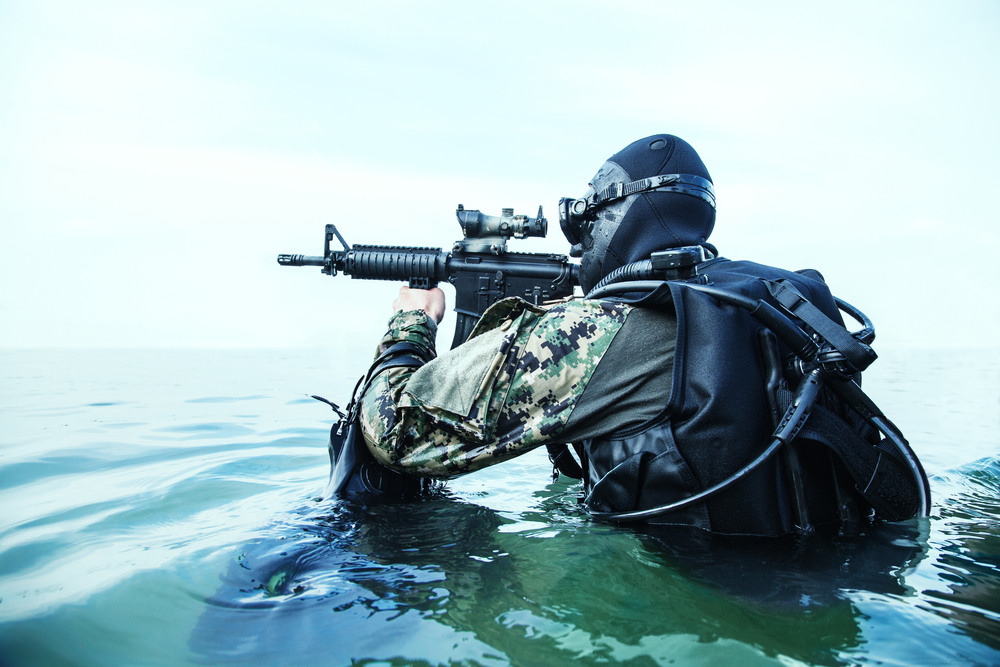Naval Special Warfare Trainees Face Tiny Enemy: Bacteria

Get the world’s most fascinating discoveries delivered straight to your inbox.
You are now subscribed
Your newsletter sign-up was successful
Want to add more newsletters?
Join the club
Get full access to premium articles, exclusive features and a growing list of member rewards.
NEW ORLEANS — Despite being young and healthy, several U.S. military trainees have developed a rare bacterial infection that usually does not affect healthy people, a new study shows.
The cases highlight the unique stresses this group of trainees, called Naval Special Warfare trainees, face that may put them at risk for infection with this bacterium, called Shewanella algae.
Naval Special Warfare trainees include Navy SEALS, Navy divers and other specialists. The bacterium is common in seawater, but most healthy people don't get sick from it even if they come into contact with the microbe. Rather, people with compromised immune systems are more likely to get sick from this bacterium. [7 Devastating Infectious Diseases]
But during training, these trainees are placed in an uncommon situation, particularly during the five-day stretch called "Hell Week," and this increases their vulnerability to infection, said Dr. Kristi Stone-Garza, a staff physician at the Naval Medical Center San Diego and the lead author of the study.
During Hell Week, the trainees spend five days on land and sea — including a lot of time in the ocean — with minimal sleep, working under "arduous conditions," according to the study.
When a person is in an extremely stressful situation like that, it's possible to induce an "immunocompromised state" in an otherwise healthy person, Stone-Garza told Live Science.
In the study, presented Friday (Oct. 28) at IDWeek 2016 here, a meeting of several organizations focused on infectious diseases, Stone-Garza and her colleagues reviewed all of the cases of S. algae infections in Naval Special Warfare trainees between 2012 and 2015.
Get the world’s most fascinating discoveries delivered straight to your inbox.
Over the study period, five men got S. algae infections, the researchers found.
Four of the men had recently completed Hell Week — and all had to be hospitalized due to serious skin infections, according to the study. The fifth man was infected not during Hell Week, but after completing an 18-foot dive during another part of his training, and rupturing his eardrum, Stone-Garza said.
In all of the cases, S. algae wasn't the only bacterium implicated in the men's infections. They all had "polymicrobial" infections, Stone-Garza said, meaning that several types of bacteria were found, including Staphylococcus aureus and Vibrio harveyi.
The symptoms of S. algae infection depend on where the bacteria get into the body, Stone-Garza said. In most cases, the bacteria get in through a break in the skin and cause abscesses or necrotizing fasciitis, she said.
In the case of the man with the ruptured eardrum, a middle-ear infection developed, Stone-Garza said.
The four hospitalized men were treated with IV antibiotics, Stone-Garza said. Some required surgery to clean their wounds, she added. The man with the ear infection was treated with oral antibiotics, she said.
All of the men who got sick were young and healthy, Stone-Garza said. But during Hell Week, they're placed under constant physiological stress: they're in an exposed environment, they may get cuts or other skin breakdowns, they don't eat well and they're not clean, she said. "It's sort of a perfect storm" for getting sick, she added.
A healthy person who wasn't involved in this type of intense training, on the other hand, could still get an S. algae infection, but he or she probably wouldn't get as sick as the Navy trainees did, or need to be hospitalized, Stone-Garza said.
Preventing infections in future trainees may be difficult, Stone-Garza said. The main way to prevent this sort of infection is to keep the men from swimming around in a contaminated environment for five days, she said.
Interestingly, S. algae infections appear to be unique to Naval Special Warfare trainees, compared with men in other similarly grueling military training programs, such as the Green Berets or Army Rangers, said Dr. Ryan Maves, the interim chairman of internal medicine at the Naval Medical Center San Diego and the senior author of the study.
In other words, there's a cluster of this type of infection among these trainees, Maves told Live Science
The findings have not yet been published in a peer-reviewed journal.
Originally published on Live Science.

 Live Science Plus
Live Science Plus











